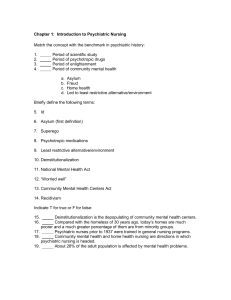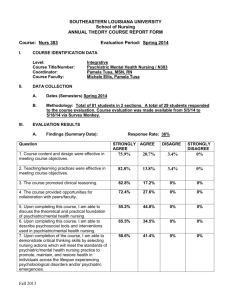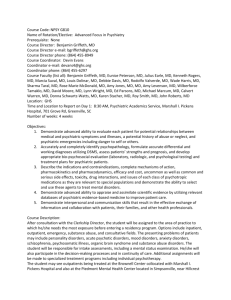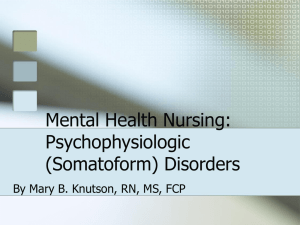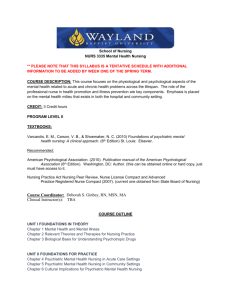Mental health theory - Philadelphia University
advertisement
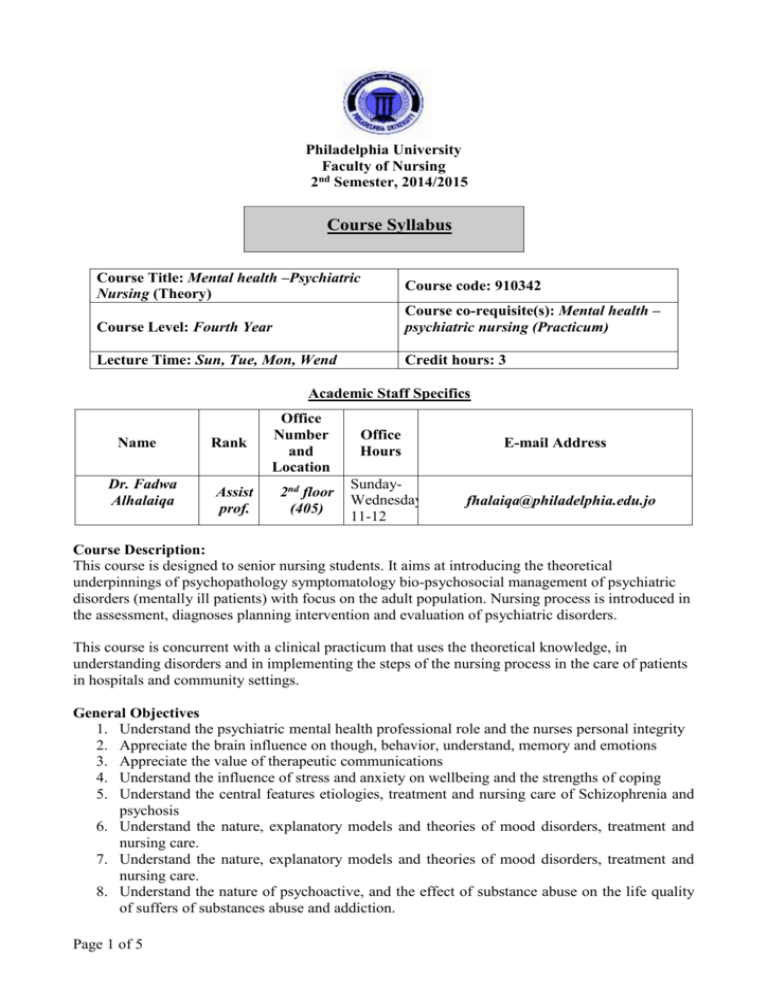
Philadelphia University Faculty of Nursing 2nd Semester, 2014/2015 Course Syllabus Course Title: Mental health –Psychiatric Nursing (Theory) Course code: 910342 Course Level: Fourth Year Course co-requisite(s): Mental health – psychiatric nursing (Practicum) Lecture Time: Sun, Tue, Mon, Wend Credit hours: 3 Academic Staff Specifics Name Dr. Fadwa Alhalaiqa Rank Assist prof. Office Number and Location 2nd floor (405) Office Hours SundayWednesday 11-12 E-mail Address fhalaiqa@philadelphia.edu.jo Course Description: This course is designed to senior nursing students. It aims at introducing the theoretical underpinnings of psychopathology symptomatology bio-psychosocial management of psychiatric disorders (mentally ill patients) with focus on the adult population. Nursing process is introduced in the assessment, diagnoses planning intervention and evaluation of psychiatric disorders. This course is concurrent with a clinical practicum that uses the theoretical knowledge, in understanding disorders and in implementing the steps of the nursing process in the care of patients in hospitals and community settings. General Objectives 1. Understand the psychiatric mental health professional role and the nurses personal integrity 2. Appreciate the brain influence on though, behavior, understand, memory and emotions 3. Appreciate the value of therapeutic communications 4. Understand the influence of stress and anxiety on wellbeing and the strengths of coping 5. Understand the central features etiologies, treatment and nursing care of Schizophrenia and psychosis 6. Understand the nature, explanatory models and theories of mood disorders, treatment and nursing care. 7. Understand the nature, explanatory models and theories of mood disorders, treatment and nursing care. 8. Understand the nature of psychoactive, and the effect of substance abuse on the life quality of suffers of substances abuse and addiction. Page 1 of 5 9. Appreciate the influence of personality traits and disorders on the functioning of the client and his family. 10. Understand the nature of eating disorder, explanatory models in the development of eating disorders, treatment modalities and nursing care 11. Understand the specific psychiatric disorders of childhood Textbook: Kneisl/Trigoboff, Instructor’s Resource Manual for Contemporary Psychiatric–Mental Health Nursing.2013, 3rd Edition. Pearson Supportive materials: - Psychiatry and mental health nursing by Raju, SM (2010) Jaypee Brothers Medical Publishers - Mental health and psychiatric nursing by George M (2010) AITBS publishers - Aguide to mental health and psychiatric nursing by Sreevani (2010) Jaypee Brothers Medical Publishers - In addition to the above, the students will be provided with handouts by the lecturer and websites to follow. Teaching Methods: 1. Lectures 2. Discussion 3. Individual and group work 4- Individual assignment and presentation 5- Video and role play Each student should search science direct database for articles that discuss any topic related to the course. Then he should present a brief summary about it. Learning Outcomes: Knowledge and understanding - Understand the theoretical underpinnings of selected psychiatric disorders - Understand the nursing conceptual framework that guide mental health-psychiatric nursing and its processes. - Understand selected concepts, and their usability in understanding human experience in mental health and mental illness. Cognitive skills (thinking and analysis). - Applying theoretical knowledge in assessing patient's and environmental conditions - Analyzing collected data to reach to nursing diagnoses. - Use theoretical rationale background in planning for the care and setting the principles of care of patients - Use standards and benchmarking in evaluation of the outcome of implementing the plan of care Communication skills (personal and academic). - Apply the communication strategies to different situations, and different settings - Utilizes feedback to develop self - Is self- aware and open to others without defensiveness - Communicates effectively with colleagues, faculty and staff. Page 2 of 5 Practical and subject specific skills (Transferable Skills). - use the internet to retrieve data - use word processor to prepare written assignments - comprehension of textbooks assigned - Able to work in groups - Public speaking (speak to the class) Course Evaluation Allocation of Marks Assessment Instruments Mark First examination Second examination Final Exam Quizzes, assignment, article presentation Total 20% 20% 40% 20% 100% * Make-up exams will be offered for valid reasons only with consent of the Dean. Make-up exams may be different from regular exams in content and format. Course Academic Calendar Weeks Subject 1st week Introduction to the course 1/3/2015 Mental Health, Mental Disorder, and Psychiatric Mental Health Clients 2nd week Psychiatric–Mental Health Nurses 8/3/3015 Self-Awareness and the Psychiatric–Mental Health Nurse 3rd week Psychiatric theory and personality development 15/3/2015 Ethics, Clients’ Rights, and Legal and Forensic Issues 4th week Psychopharmacology 22/3/2015 Page 3 of 5 5th week Stress, Anxiety and coping 29/3/2015 Cognitive disorder 6th week Schizophrenia 5/4/2015 First exam 7th week Schizophrenia 12/4/2015 8th week Mood Disorders 19/4/2015 9th week Anxiety Disorders 26/4/2015 Substance related disorders 10th week Anxiety related disorders 3/5/2015 Eating disorder 11th week 2nd Exam 10/5/2015 Personality Disorders 12th week Personality disorders 17/5/2015 13th week Maladaptive behaviors 24/5/2015 14th week Intra-family violence 31/5/2015 15th week Revision 7/6/2015 16th week Final Exam (---------) 14/6/2015 Attendance Policy: Absence from lectures and/or tutorials shall not exceed 15%. Students who exceed the 15% limit without a medical or emergency excuse acceptable to and approved by the Dean of the relevant college/faculty shall not be allowed to take the final examination and shall receive a mark of zero for the course. If the excuse is approved by the Dean, the student shall be considered to have withdrawn from the course. Documentation and Academic Honesty Submit your home work typed covered with a sheet containing your name, number, course title and number, and type and number of the home work (e.g. tutorial, assignment, and project). Any completed homework must be handed in to my office by 15:00 on the due date. After the deadline “zero” will be awarded. You must keep a duplicate copy of your work because it may be needed while the original is being marked. Follow the instructions for each assignment. Protection by Copyright Coursework, laboratory exercises, reports, and essays submitted for assessment must be your own work, unless in the case of group projects a joint effort is expected and is indicated as such Use of quotations or data from the work of others is entirely acceptable, and is often very valuable provided that the source of the quotation or data is given. Failure to provide a source or put quotation marks around material that is taken from elsewhere gives the appearance that the Page 4 of 5 comments are ostensibly your own. When quoting word-for-word from the work of another person quotation marks or indenting (setting the quotation in from the margin) must be used and the source of the quoted material must be acknowledged. Sources of quotations used should be listed in full in a bibliography at the end of your piece of work. Avoiding Plagiarism. 1. Unacknowledged direct copying from the work of another person, or the close paraphrasing of somebody else's work, is called plagiarism and is a serious offence, equated with cheating in examinations. This applies to copying both from other students' work and from published sources such as books, reports or journal articles. 2. Paraphrasing, when the original statement is still identifiable and has no acknowledgement, is plagiarism. A close paraphrase of another person's work must have an acknowledgement to the source. It is not acceptable for you to put together unacknowledged passages from the same or from different sources linking these together with a few words or sentences of your own and changing a few words from the original text: this is regarded as over-dependence on other sources, which is a form of plagiarism. 3. Direct quotations from an earlier piece of your own work, if not attributed, suggest that your work is original, when in fact it is not. The direct copying of one's own writings qualifies as plagiarism if the fact that the work has been or is to be presented elsewhere is not acknowledged. 4. Plagiarism is a serious offence and will always result in imposition of a penalty. In deciding upon the penalty the Department will take into account factors such as the year of study, the extent and proportion of the work that has been plagiarized, and the apparent intent of the student. The penalties that can be imposed range from a minimum of a zero mark for the work (without allowing resubmission) through caution to disciplinary measures (such as suspension or expulsion). Page 5 of 5
